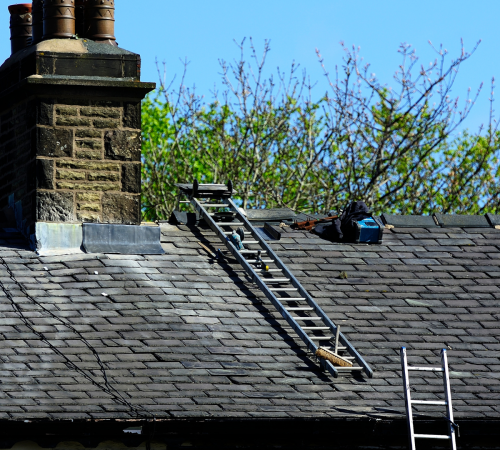How Chimney Repairs Improve Your Home’s Safety
The Importance of Fixing Damaged Chimneys Promptly
When it comes to home maintenance, certain tasks often take a backseat, even though they are critical to our safety. One of these tasks is chimney repairs. Chimneys are an essential part of your home’s heating system, but over time, wear and tear can cause serious damage. This damage can create dangerous situations, from carbon monoxide leaks to chimney fires. Fortunately, regular chimney repairs can improve your home’s safety and prevent these risks.
In this blog, we will explore why chimney repairs are important for the safety of your home and family, the risks that arise from neglecting chimney maintenance, and how regular repairs can help you avoid costly and dangerous situations.
The Role of a Chimney in Your Home’s Safety
A chimney plays a vital role in venting smoke, gases, and heat from your fireplace or heating system to the outside of your home. Without a properly functioning chimney, dangerous gases like carbon monoxide can seep back into your living space. Carbon monoxide is a colorless, odorless gas that can be lethal when inhaled in large quantities.
Additionally, chimneys are crucial for preventing chimney fires, which can quickly spread to other parts of the home. Chimney fires are often caused by the buildup of creosote, a byproduct of burning wood. If not removed regularly, creosote can ignite, leading to dangerous fires inside the chimney.
The Risks of Neglecting Chimney Repairs
While chimneys are designed to be durable, they are not invincible. Over time, factors like weather conditions, age, and general wear can cause damage that compromises their functionality. Ignoring chimney repairs can lead to several safety hazards, including:
Carbon Monoxide Poisoning
The primary function of a chimney is to safely vent gases outside the home. If the chimney is damaged, blocked, or improperly constructed, these gases, including the dangerous carbon monoxide, can enter the living space. Carbon monoxide poisoning is a serious risk, and symptoms include headaches, dizziness, nausea, and even loss of consciousness. In extreme cases, it can be fatal.
Chimney Fires
As mentioned earlier, creosote buildup is a common cause of chimney fires. Creosote is a highly flammable substance that forms when wood burns. If not cleaned out, creosote can ignite, resulting in a fire that can quickly spread throughout the chimney and even into the rest of the home. Chimney fires are often silent and difficult to detect until they’ve already caused significant damage. This makes regular chimney cleaning and repairs crucial for preventing such fires.

Water Damage to Your Home’s Structure
Chimneys are exposed to the elements, which means they are vulnerable to water damage. Rain, snow, and ice can infiltrate cracks in the chimney, causing rusting of metal components, rotting of wood, and deterioration of the masonry. Over time, water can cause extensive damage to the chimney’s structure, potentially compromising its ability to function safely. Water damage can also affect the roof and the surrounding walls of your home, leading to costly repairs.
Smoke Backdraft
If a chimney is not properly maintained or repaired, it can lead to a dangerous phenomenon known as smoke backdraft. This occurs when smoke from the fireplace or heating system is unable to escape the chimney and instead flows back into your home. Smoke backdraft can cause poor indoor air quality, leaving your home filled with dangerous smoke and toxic gases. This is not only uncomfortable but also harmful to your health.
How Chimney Repairs Improve Your Home’s Safety
Now that we understand the risks associated with neglecting chimney repairs, let’s dive into how regular maintenance and timely repairs can improve your home’s safety.
- Ensuring Proper Ventilation: Chimney repairs ensure gases like carbon monoxide are safely vented outside, preventing dangerous buildup inside your home. Regular maintenance guarantees proper airflow, reducing the risk of poisoning or suffocation.
- Preventing Chimney Fires: Regular chimney cleaning and repairs remove creosote buildup, a leading cause of chimney fires. Addressing cracks or damage in the lining reduces the risk of heat ignition and fire spread within the chimney.
- Protecting Against Water Damage: Chimney repairs, like installing caps and waterproofing treatments, protect against rain and snow infiltration. This prevents rust, rotting, and masonry deterioration, preserving both the chimney’s function and your home’s structure.
- Improving the Structural Integrity of Your Chimney: Regular chimney repairs address cracks, deteriorating masonry, or damaged liners, preventing further structural issues. Ensuring your chimney is sound prevents collapse, maintaining safety and preventing potential fire hazards.
- Enhancing Smoke Flow and Reducing Backdrafts: Repairs clear blockages and fix damaged flue liners, ensuring optimal smoke flow. Proper ventilation reduces the risk of smoke backdrafts, improving indoor air quality and making your home safer and more comfortable.
What to Expect During Chimney Repairs
During chimney repairs, a professional technician will begin with a thorough inspection to identify any issues such as cracks, blockages, creosote buildup, or water damage. They will carefully examine the chimney’s structure, including the flue, liner, and masonry, to ensure everything is functioning properly. If necessary, the technician will remove soot and debris, clean the chimney, and check for any potential hazards that could lead to carbon monoxide leaks or fires.
Once the inspection is complete, the technician will recommend the appropriate repairs, which may include chimney sweeping, masonry restoration, waterproofing, or flue relining. The repairs ensure your chimney operates efficiently and safely, helping to prevent future damage and hazards.
How Often Should You Have Chimney Repairs?
Chimney repairs should be performed regularly to ensure the safety and efficiency of your chimney. It’s recommended to have a professional inspection at least once a year, preferably before the heating season begins. An annual inspection will help detect any issues, such as creosote buildup, cracks, or water damage, before they become significant problems. The technician can clean the chimney, remove obstructions, and address minor repairs that might otherwise lead to more costly damage.
If you use your fireplace frequently or burn wood that produces a lot of creosote, more frequent inspections may be necessary. Regular maintenance can prevent chimney fires, carbon monoxide leaks, and structural damage, extending the lifespan of your chimney.
Conclusion
In conclusion, regular chimney repairs are essential for maintaining your home’s safety and efficiency. Ensuring proper ventilation, preventing chimney fires, protecting against water damage, and enhancing the structural integrity of your chimney are all key benefits of timely repairs. These efforts not only reduce risks like carbon monoxide poisoning and house fires but also help preserve the longevity of your chimney system, saving money on costly repairs in the future.
Myer’s Olympic Masonry in Olympia understands the importance of a well-maintained chimney. Expert chimney inspections and repairs help keep your home safe and comfortable. Don’t wait until a minor issue turns into a major hazard—contact Myer’s Olympic Masonry for professional chimney care today!
